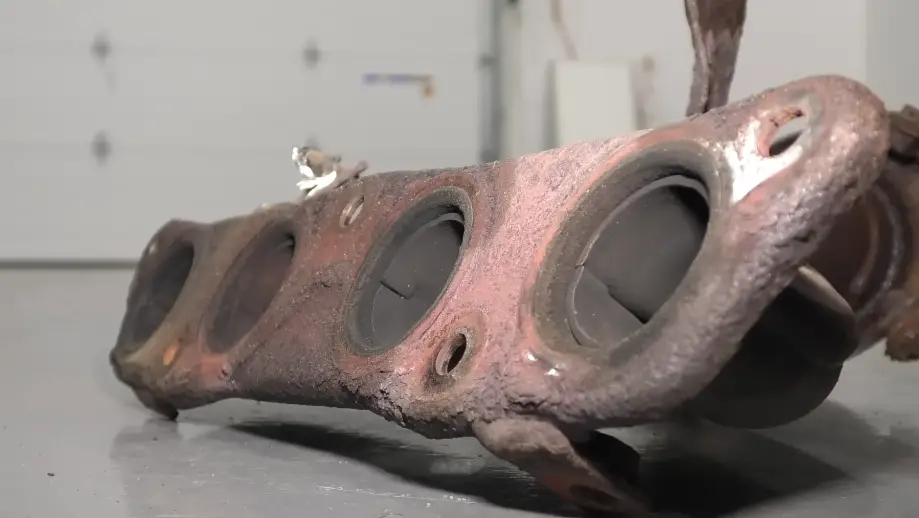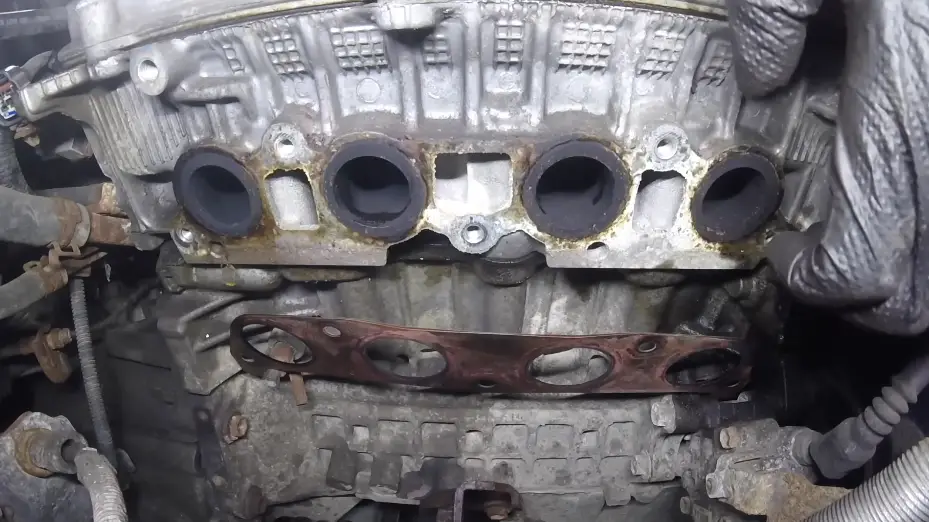Yes, an exhaust manifold leak can cause a ticking noise. This occurs because escaping exhaust gases create a rhythmic ticking or tapping sound, especially when the engine is cold. The noise results from the pressurized gases escaping through cracks or gaps in the manifold or its gasket.
If you’ve ever heard a strange ticking sound coming from your car’s engine, you’re not alone. Many drivers experience this at some point, and the culprit is often something you might not expect: an exhaust manifold leak. The exhaust manifold plays a critical role in directing exhaust gases away from the engine, but when it develops a leak, a variety of problems can arise, including that persistent and unsettling ticking noise.

Contents
What is an Exhaust Manifold and What Does It Do?
The exhaust manifold is an essential part of your car’s exhaust system, serving as the first point where exhaust gases from the engine cylinders are collected. It then directs these gases into the exhaust pipe and, eventually, through the catalytic converter and muffler before they are expelled out of the tailpipe.
Typically made of cast iron or stainless steel, the manifold is designed to withstand extreme temperatures and pressure variations from the exhaust gases. However, like any mechanical component, it can wear out or become damaged over time.
What Causes an Exhaust Manifold Leak?
There are several reasons why an exhaust manifold might develop a leak:
- Warping or Cracking: Over time, extreme temperature changes in the exhaust manifold can cause it to warp or even crack. This is especially true in performance vehicles or cars driven hard over time. Warping can prevent the manifold from properly sealing against the engine block, allowing exhaust gases to escape.
- Gasket Failure: The exhaust manifold gasket is responsible for creating a tight seal between the manifold and the engine. If this gasket becomes worn out or damaged, it can allow gases to leak out, resulting in a ticking noise.
- Loose or Broken Bolts: Bolts securing the exhaust manifold to the engine can loosen or break due to thermal expansion and contraction. This can cause the manifold to separate slightly from the engine block, creating an opening for gases to escape.
- Corrosion: Over time, corrosion from moisture and other environmental factors can cause the manifold or gasket to degrade, leading to leaks.
How Does Exhaust Manifold Leak Cause Ticking Noise?
An exhaust manifold leak can produce a ticking noise due to escaping exhaust gases. Here’s how it works:
- Escaping Gases: As the engine runs, exhaust gases are forced out of the combustion chambers with considerable pressure. When the exhaust manifold is damaged, these gases can escape through gaps or cracks. The sudden release of pressurized gases can create a ticking or tapping sound, especially when the engine is cold.
- Thermal Expansion: The ticking may be more noticeable when the engine is first started because, at that point, the manifold is still cool, and any gaps between the manifold and engine block are more pronounced. As the engine heats up, the manifold expands, potentially reducing the size of the gaps and lessening the noise.
- Pulsation: The noise can also be rhythmic, corresponding with the engine’s RPMs. This rhythmic ticking is often one of the telltale signs of an exhaust manifold leak.
Diagnosing an Exhaust Manifold Leak
If you suspect an exhaust manifold leak is causing the ticking noise, there are several ways to confirm it:
- Visual Inspection: With the engine cool, inspect the area around the exhaust manifold for signs of damage or leakage. Look for cracks, missing bolts, or black soot, which can indicate where exhaust gases are escaping.
- Listening to the Engine: Start the engine and listen carefully for the ticking noise. Pay attention to whether the noise gets louder when you accelerate or if it diminishes as the engine warms up.
- Smoke Test: A smoke test can help pinpoint the exact location of the leak. This test involves injecting smoke into the exhaust system and looking for areas where the smoke escapes.
- Feel for Exhaust Gas: With the engine running (and using proper safety precautions like gloves), you can carefully feel around the exhaust manifold area to see if you can detect exhaust gases escaping from a specific point.
Potential Consequences of Ignoring an Exhaust Manifold Leak
An exhaust manifold leak is not just a noise issue; it can lead to more severe problems if left unchecked:
- Reduced Engine Performance: A leak can cause an imbalance in the air-to-fuel ratio, leading to poor engine performance, decreased fuel efficiency, and even engine misfires.
- Damage to Nearby Components: The escaping hot gases can damage nearby components, including wiring, hoses, and sensors, leading to more expensive repairs down the line.
- Harmful Emissions: A leaking exhaust manifold allows unfiltered exhaust gases to escape into the atmosphere, increasing the emission of harmful pollutants.
- Catalytic Converter Damage: Over time, exhaust leaks can cause the engine to run richer than usual, which can damage the catalytic converter—a costly component to replace.
How to Fix an Exhaust Manifold Leak
Once you’ve identified an exhaust manifold leak, you have several repair options, depending on the severity of the issue:
- Tightening Bolts: If the bolts have loosened over time, simply tightening them may solve the problem. Be careful not to over-tighten, as this can cause the manifold to crack.
- Replacing the Gasket: If the gasket is damaged or worn out, replacing it can restore the proper seal between the manifold and the engine.
- Welding: For small cracks in the exhaust manifold, welding may be an option. However, this is generally a temporary fix, as the manifold may continue to deteriorate.
- Replacement: If the manifold is severely cracked or corroded, replacing it may be the best option. While this is a more expensive repair, it ensures a long-term solution.

Preventing Future Exhaust Manifold Leaks
To prevent future exhaust manifold leaks, consider the following maintenance tips:
- Regular Inspections: Periodically check the exhaust system, especially if your vehicle is older or you drive under harsh conditions. Catching minor issues early can save you from more extensive repairs later on.
- Use High-Quality Parts: When replacing exhaust manifold gaskets or bolts, use high-quality, heat-resistant parts to ensure a secure and long-lasting seal.
- Avoid Overheating: Keep your engine from overheating, as excessive heat can cause the exhaust manifold to warp or crack.
Frequently Asked Questions
Here are some FAQs about exhaust manifold leak –
Can an exhaust manifold leak cause engine misfires?
Yes, an exhaust manifold leak can cause an imbalance in the air-to-fuel mixture, leading to engine misfires. This is especially true if the leak is near an oxygen sensor.
Will an exhaust manifold leak affect fuel efficiency?
Yes, a leak can cause the engine to run inefficiently, resulting in reduced fuel economy. The engine may compensate for the leak by using more fuel than necessary.
Can a leaking exhaust manifold trigger a check engine light?
Yes, in some cases, a leaking exhaust manifold can trigger the check engine light, especially if it affects sensors like the oxygen sensor or if the leak causes engine performance issues.
How much does it cost to repair an exhaust manifold leak?
The cost can vary depending on the severity of the leak and the make and model of your vehicle. Simple fixes like tightening bolts or replacing a gasket may cost $100–$300, while replacing the manifold itself can range from $500–$1,500 or more.
Can I drive with an exhaust manifold leak?
While it’s technically possible to drive with an exhaust manifold leak, it’s not recommended. Over time, the leak can cause engine performance issues and damage other components. Additionally, you’ll be releasing harmful emissions into the environment.
Conclusion
An exhaust manifold leak may seem like a minor annoyance at first, but ignoring it can lead to more significant problems, including engine performance issues and potential damage to other components. By understanding the signs of a leak, diagnosing the issue, and taking appropriate action, you can prevent further damage and keep your car running smoothly. If you hear that distinctive ticking noise, it’s best to address it sooner rather than later!